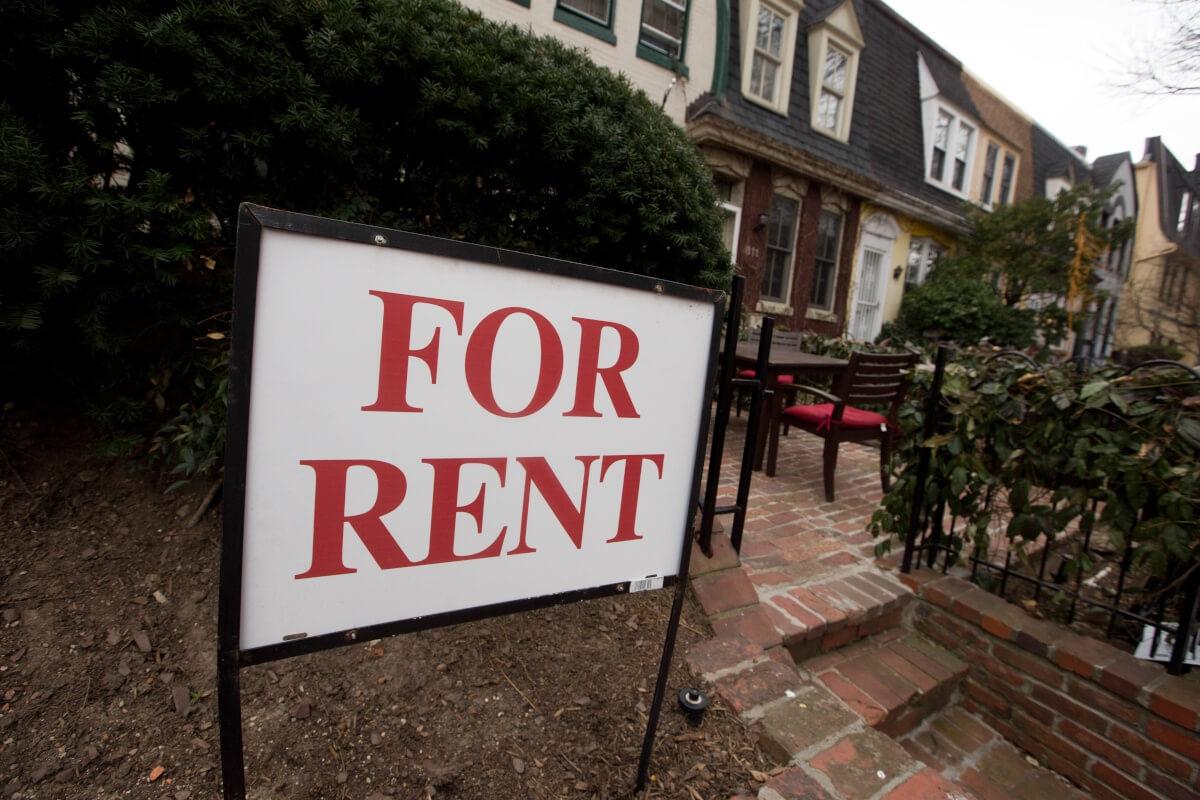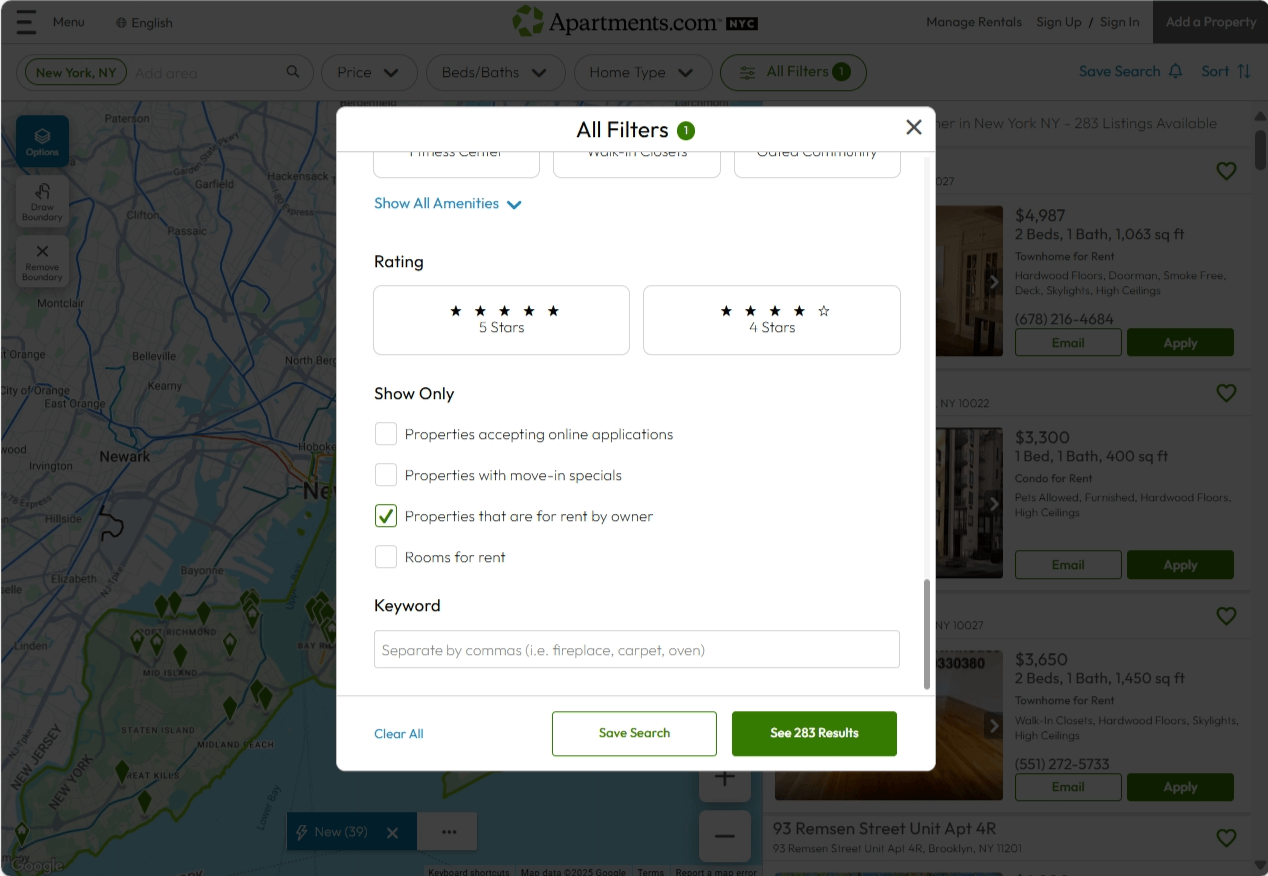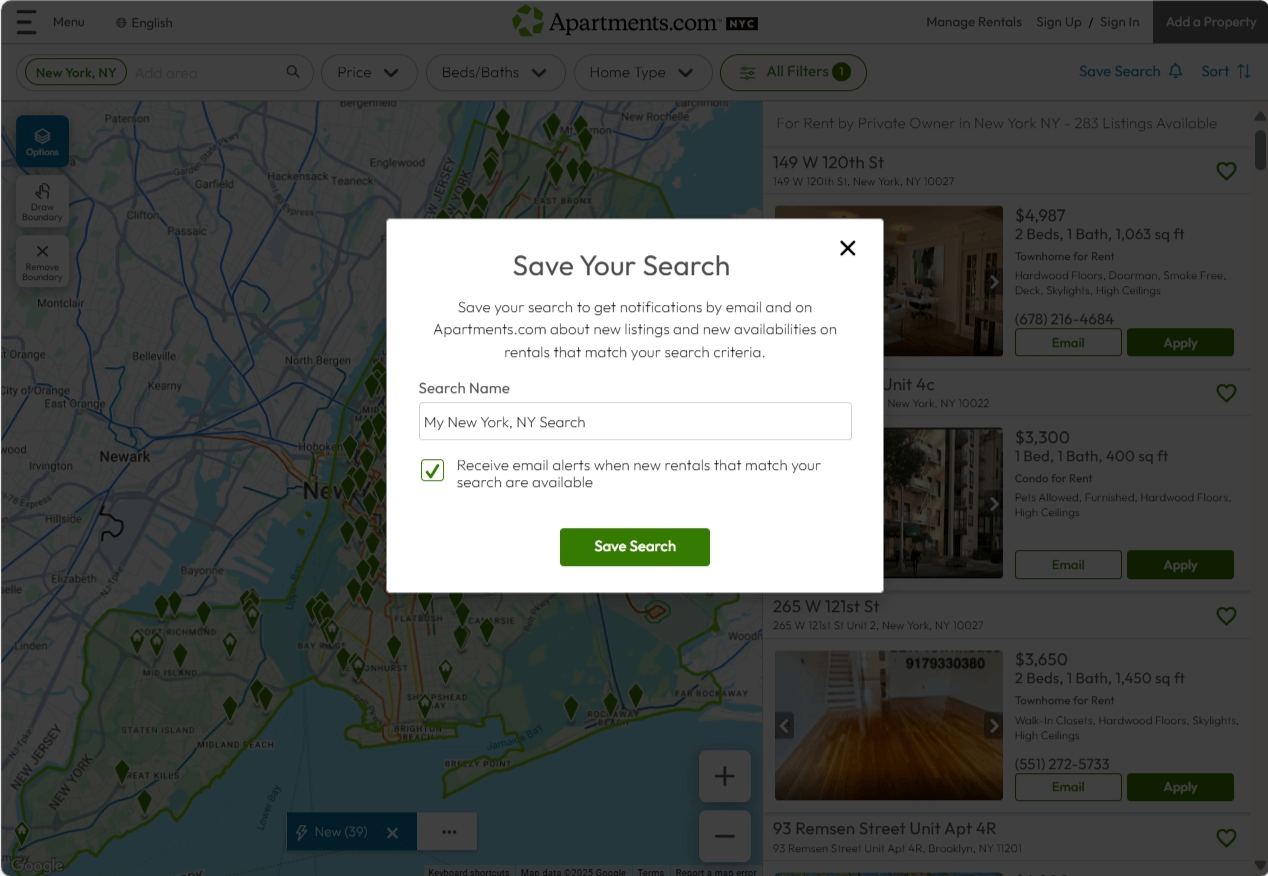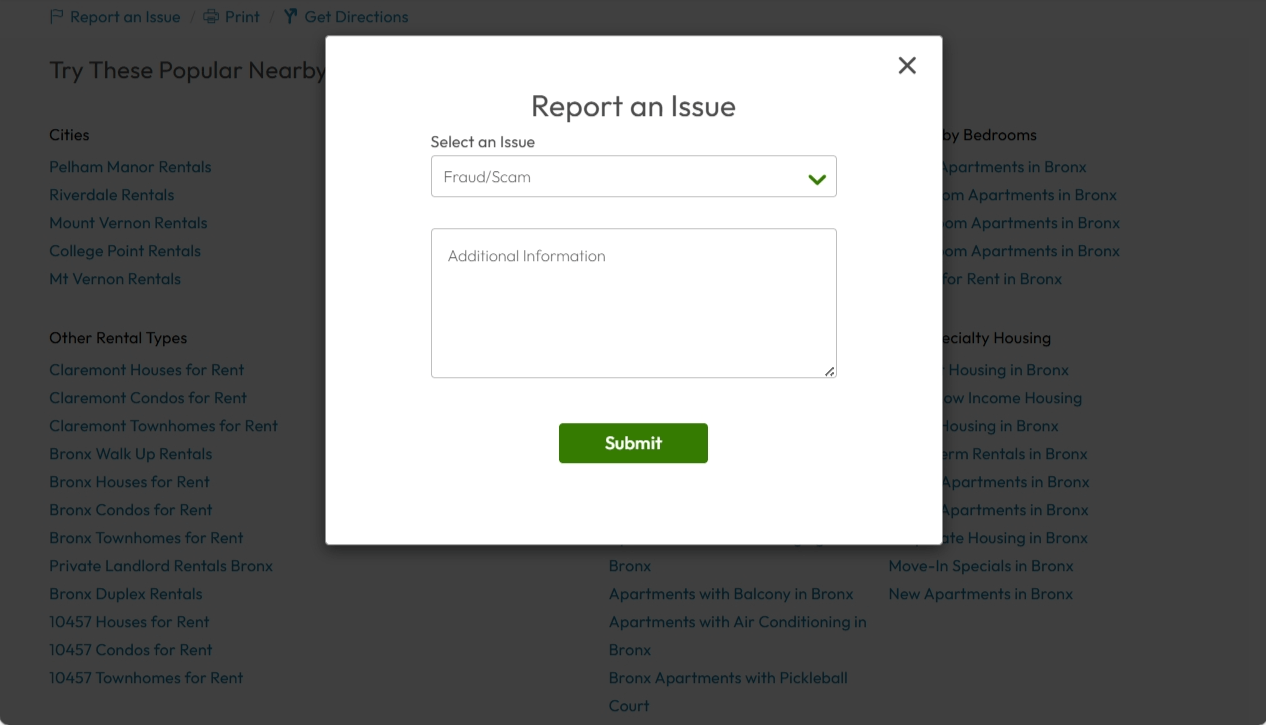Renting from a private landlord gives you a customized experience in a one-of-a-kind rental, and the personability of an independent landlord is a major selling point for some renters.
However, it can be hard to find a private landlord. Luckily, Apartments.com makes it easy to connect with private landlords and find a place that has everything you need.
Table of Contents
- What Is a Private Landlord?
- Why Rent From a Private Landlord?
- Where to Find Private Landlords
- Red Flags to Watch Out For
- How to Avoid and Report Fraud
- FAQs
What Is a Private Landlord?
A private landlord is an individual who owns a property that they rent out to tenants, usually single-family homes or townhomes listed as “for rent by owner” or “FRBO.” Individual landlords often have a traditional 9-5 job and manage properties as a side hustle.
Independent landlords vs. property management companies
Property management companies are large corporations that have multiple properties in different cities and states. Property management companies typically own large multifamily communities as opposed to single-family homes.
Unlike property management companies, private landlords usually own just a few properties in the same city. They often live close to the properties they manage, making it easy for residents to contact them.
Why Rent from a Private Landlord?

Renting from a private landlord has advantages and disadvantages—it’s up to you to decide what works best.
Pros of renting from a private landlord
Many renters prefer to rent from an independent landlord because of the personalized experience. Because a private landlord only rents out a few properties, they don’t have to split their attention between dozens of tenants.
Flexibility
Private landlords can be more flexible since they make their own rules. An independent landlord may be more willing to negotiate on rent, fees, or lease terms, which can make renting from a private landlord a great option for renters with no credit, bad credit, or an eviction on their record.
Fewer fees
Private landlords generally charge fewer fees than large property management companies since you’re not paying for flashy amenities like a pool or fitness center. Because of this, renting from a private landlord can be a great way to stick to a budget.
Personalized communication
When you rent from a large company, you’ll likely communicate with several employees over the course of your lease. A leasing office won’t respond outside of business hours unless it’s for emergency maintenance, which can be frustrating if you’re not home during business hours.
However, many private landlords give tenants their personal cell number and will respond outside of traditional work hours. Or, if their property lives on Apartments.com, they may also communicate through our state-of-the-art messaging feature.
Now on Apartments.com, you can directly communicate with landlords right from the listing. Whether to send an initial inquiry, ask about your application, or simply introduce yourself, our messaging platform allows for seamless and flexible communication between tenants and landlords.
Cons of renting from a private landlord
Informal processes
While informal modes of communication can make it easier to communicate with a landlord, the lack of informal processes can be a point of frustration for some renters. Private landlords often don’t have structured processes in place for requesting a tour, negotiating lease terms, or submitting maintenance requests, which leaves room for mismatched expectations between landlords and renters.
Slower repairs
Private landlords might be slower to respond to maintenance requests, especially if they manage multiple properties. They usually handle everything on their own, so it’ll take them more time to take care of maintenance issues than it would for a leasing office with multiple employees.
Fewer amenities
Because private landlords work with smaller budgets than property management companies, you won’t get the same high-end amenities you might find at a large apartment community. While this means you likely won’t pay an amenity fee, you also won’t get a business center or EV charging station.
Where to Find Private Landlords

Private landlords typically don’t have a polished website like large apartment communities do, but there are plenty of ways to find a property for rent by owner.
Apartments.com

According to CoStar data, 35% of available units on Apartments.com are listed by private landlords managing fewer than three properties. If you want to rent from an independent landlord, Apartments.com is the place to look.
Apartments.com makes it easy to search for properties for rent by private landlords. Once you know where you want to live, scroll to the bottom of the filters popup and select “Properties that are for rent by owner.” This will narrow your search to listings by independent landlords.
When a privately-owned listing catches your eye on Apartments.com, you can then use our messaging tool to chat with the owner directly. Rather than waiting for an email response or a phone call, you can speak with the landlord instantly and get your questions promptly answered.
Online forums
Scroll through neighborhood forums or social media groups for the area you’re looking to move to. Private landlords often advertise their rentals on localized platforms like Nextdoor or Facebook groups, and you’ll be able to message them directly about their property.
Word of mouth
Keep an eye out for “For Rent” signs planted in front of houses and townhomes or ads in community centers. Ask around to see if people in the area know of a landlord looking to fill a vacancy.
Tools to streamline the hunt
If you’re leisurely looking for a new place to live, setting up alerts can help you find new listings.
Save a search on Apartments.com

Saving your search on Apartments.com will give you exclusive updates on the newest rentals.
After you’ve searched an area and applied all your filters, navigate to the upper righthand corner and select “Save Search.” Name your search, then opt in to receive email alerts for new listings that match what you’re looking for.
Set Google Alerts
Setting Google Alerts for phrases like “for rent by owner” with the city you’re looking to move to can be a great way to monitor the internet for new listings. You’ll get an email anytime Google detects a new result for the keywords you enter.
Red Flags to Watch Out For

It can be harder to verify a property’s legitimacy when it’s managed by a private landlord. Listings by independent landlords typically look less polished than those by a property management company, and a private landlord’s rental won’t have the same number of reviews as a large apartment community.
With these roadblocks making it hard to determine what’s real and what’s fake, it’s important to know the warning signs of a rental scam.
Too good to be true
Be skeptical of rentals listed for significantly less than the going rate for similar rentals in the same area. Scammers try to reel in victims with what seems like a great deal.
Pressure to pay
Scammers like to create a sense of urgency to make you feel pressured to hand over money. Beware of landlords who pressure you to pay to tour a property or secure a rental, and be suspicious if they only accept payments through unusual methods like cash or wire transfer.
Refusal to show the property
Scammers typically either copy a rental listing or completely fabricate one, so they don’t have access to the property. A fake landlord will find any excuse for why they can’t give you a tour, like that they’re out of the country for a prolonged period.
No tenant screening required
Background checks help landlords avoid leasing their property to renters who won’t pay rent on time, so it’s a red flag if a landlord doesn’t have a screening process in place. Scammers might frame this as a “perk” to attract renters who don’t want their credit score taking a hit from a hard credit pull, but this usually means a scammer is anxious for you to send money.
How to Avoid and Report Fraud
Legitimate landlords understand that signing a lease is a big decision and a financial commitment. Take your time with the rental process and take necessary measures to avoid rental scams.
Verify the information
Search the address online and confirm that the information in the listing matches up. Cross-reference the contact information to verify the landlord’s identity, and meet them in person if possible.
Tour the property
Tour the property in person with the property manager, if possible. If you can’t tour in person, schedule a video call with the landlord so they can show you around the rental virtually. This helps you avoid scammers and get to know your potential landlord.
Use secure forms of payment
Paying rent online though secure platforms like Apartments.com is the safest way to go, but Venmo, PayPal, and ACH transfer are also secure methods. Some legitimate landlords may request paper checks, but they should understand hesitations around unsecure payment methods and should be willing to compromise.
Report fraud

While we do our best to prevent cybercrime, scammers work fast. If you come across a suspicious listing on Apartments.com, report the listing by clicking “Report an Issue” at the bottom of the page. Select “Fraud/Scam” and include any information about why you believe the listing to be fraudulent.
If you suspect you were the victim of a rental scam, contact your bank or credit card company immediately to cancel the transactions. File a report with the Internet Crime Complaint Center (IC3), your local police department, your state attorney general’s office, or the Federal Trade Commission (FTC).
Rent from a Private Landlord on Apartments.com
If you’re looking for an informal, low-key renting experience, a private landlord may be the way to go. Apartments.com makes it easy to find properties for rent by owner, and our customizable filters allow you to narrow your search to your nonnegotiables. Take your time, shop around, and enjoy the personalized experience that comes with renting from a private landlord!
If you have more questions about privately-owned properties, check out our blog for more helpful renter resources. Whether you need help reviewing your lease agreement, negotiating rent, or making customizations to your rental, we’re here to aid your renter journey.
FAQs
Is renting from a private landlord cheaper?
Yes, it’s often cheaper to rent from a private landlord because you’re not paying for the same amenities you’d find at a large apartment community. However, landlords are still entitled to charge any fees within state regulations.
Is it better to rent from a private landlord?
Whether it’s better to rent from a private landlord or a property management company is entirely up to you and your needs. If you have bad credit or an eviction on your record, it may be easier to secure a lease from a private landlord than a large apartment community.
How do I verify that the landlord actually owns the property?
You can check the property’s ownership through your local tax assessor or property records office online. Make sure the landlord’s name matches the official records or ask for documentation like a recent tax bill or mortgage statement.
Can I negotiate lease terms with a private landlord?
Yes, private landlords are often more flexible and open to negotiation. You might be able to adjust the lease length, security deposit, or pet policies—just be sure any changes are written into the lease.






